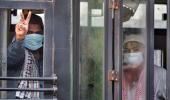The Supreme Court on Tuesday expressed displeasure over the Centre's affidavit in the case related to media reporting of Tablighi Jamaat congregation in New Delhi during the onset of COVID-19 pandemic, and said the government should consider setting up a regulatory mechanism to deal with such contents on TV.

Observing that the ministry of information and broadcasting's affidavit did not deal with the applicability of Cable Television Network Act in the case, the apex court said the government has the power to put a regulatory mechanism in place and it cannot be left to an outside agency like NBSA (News Broadcasters Standards Authority.
"We want to know the mechanism employed by you and this affidavit has nothing on it. Why should we refer to NBSA etc. when you have the authority to look into it. If it does not exist then you create an authority. We can also hand it over to an outside agency," said a bench headed by Chief Justice S A Bobde.
The top court, which was hearing the pleas filed by Jamiat Ulama-I-Hind and others alleging that a section of the media was spreading communal hatred over Tablighi Jamaat congregation during the onset of pandemic, asked the Centre to file a fresh affidavit dealing with mechanism to regulate electronic media under the CTNA.
The congregation at Nizamuddin Markaz in the national capital in March, attended by thousands of Indian and foreign nationals, was cited as being responsible for accelerating the spread of coronavirus or COVID-19, with its attendees allegedly carrying the infection to different parts of the country.
Solicitor General Tushar Mehta, appearing for the Centre, referred to the freedom of speech and expression of the media and said that NBSA is a part of the self-regulatory mechanism.
The apex court however asked the Centre to consider creating a regulatory mechanism and apprise it on the issue. It said the government should also inform as to what steps have been taken under the CTNA.
"First you did not file a proper affidavit and then you filed an affidavit which did not deal with the two important questions. This way it cannot be done Mr Mehta," the bench, also comprising Justices A S Bopanna and V Ramasubramanian, told the law officer.
"Mr Mehta, we are not satisfied with your reply. We wanted you to tell as to what actions you have taken under the Cable TV Network Act," said the bench.
The top court said further said: "We want to know what is the mechanism to deal with these contents on television. If there is no regulatory mechanism then you create one. Regulation cannot be left to organisations like NBSA."
Mehta told the bench that several actions have been taken under the Act.
"You have to tell us how you have acted under Cable TV Act in some prior incident," the bench said, questioning Mehta as to why the Centre has not created a body to regulate these things.
The bench said it had asked the Centre to specify how CTNA could be used to control the content of cable TV network and also about steps which could be taken to deal with such complaints but the affidavit is silent on these aspects.
The top court has posted the matter for hearing after three weeks.
The I&B ministry affidavit said a majority of leading national newspapers have carried "largely factual reports" on the issue.
Online news portals such as The Print and The Wire have also undertaken objective reporting, through news reports, and analysis, through opinion and editorial articles of events concerning the Tablighi Jamaat.
"By and large, issues relating to health, law and order and the action taken by the central government and the various state governments for handling the pandemic have been discussed," the affidavit said.
It also said that the ministry of electronics and information technology has issued orders for blocking fake or misleading content related to the issue of coronavirus on social media.
On October 8, the apex court had observed that freedom of speech and expression is the 'most abused right' in recent times and pulled up the Centre for its "evasive" and "brazen" affidavit on media coverage of the Tablighi Jamaat event earlier this year.
The top court was irked over the fact that instead of secretary of the Information and Broadcasting Ministry, an additional secretary filed the affidavit which contained 'unnecessary' averments with regard to media reporting in Tablighi Jamaat issue.
In August, the Centre had told the apex court that a Muslim body's attempt to obtain a blanket "gag order" on the entire media to prevent them from reporting of the Nizamuddin Markaz issue would effectively destroy the freedom of the citizenry to know and the right of journalists to ensure an informed society.
The government had said that in the absence of any specific information about any objectionable news published or aired by a specific news channel/agency, the Constitution and the applicable statutes do not give it any authority to unilaterally pass any censure order under the CTNR.
The Jamiat Ulama-I-Hind plea sought directions to the Centre to stop dissemination of "fake news" related to the Nizamuddin congregation and take strict action against those responsible for it.











 © 2025
© 2025